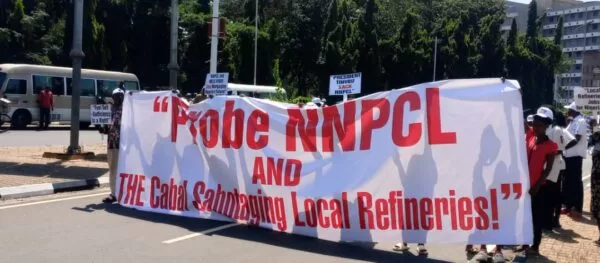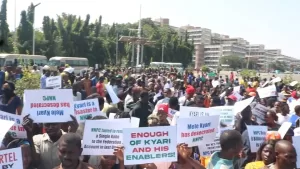A group of civil society organizations, the Nigerian Coalition of Civil Society Organisations (NICOSO), has called for an immediate investigation into alleged sabotage against the government’s plan to revive the country’s petroleum refineries.
The coalition has also demanded the removal from office of the Group Chief Executive Officer (GCEO) of the Nigerian National Petroleum Company Limited (NNPCL), accusing him of mismanaging the oil industry and doing more harm than good to Nigeria’s local refineries.
The group made these demands during a protest rally at the National Assembly Complex in Abuja on Friday, where they voiced strong criticism of the NNPCL’s policies, which they claim are profit-driven and obstruct initiatives meant to support energy self-sufficiency and create jobs within the country.
Addressing journalists at the event, the national spokesperson for the group, Segun Adebayo, expressed concerns over the policies and operations of the NNPCL, which he said continue to prioritize imported fuel at the expense of local refining. He called on President Bola Tinubu to intervene and prevent policies that could lead the country into further economic challenges.
Adebayo said, “Despite Nigeria’s potential to refine fuel locally, vested interests within the NNPCL continue to impose Premium Motor Spirit importation on Nigeria. This unnecessary import dependency costs Nigeria billions in foreign exchange every year, placing our economy under enormous strain. Meanwhile, the people bear the brunt of fluctuating global oil prices and currency devaluation, and this cabal profits from maintaining the status quo.”
He added, “We must hold accountable those who prioritise personal gain over national prosperity. They are frustrating the nation’s move toward self-sufficiency, ensuring that Nigeria remains exposed to the volatility of the international oil market. This is unacceptable and unsustainable for a nation as richly endowed with natural resources as ours.”
Adebayo also pointed out the efforts of Nigerian industrialists, such as Aliko Dangote, who have invested heavily in local refineries to reduce the country’s reliance on imported fuel. He criticized the NNPCL for allegedly hindering the operations of these local refineries.
“Nigerian industrialists, such as Aliko Dangote, have invested heavily in local refineries to curb Nigeria’s reliance on imported fuel. The Dangote Refinery represents a transformative opportunity for energy independence and economic growth. However, instead of supporting these efforts, the cabal at the NNPCL has actively hindered local refinery operations, prioritising imported PMS and discouraging local refining. This calculated sabotage deters investors, limits job creation, and keeps Nigeria locked in economic dependency.”
Adebayo urged President Tinubu to act decisively against those he described as sabotaging the country’s energy sector, calling for an investigation into the “cabal” within the NNPCL.
“We know President Tinubu loves Nigeria and wants the best for Nigeria; hence, we urge him to caution the NNPCL leadership, led by Mele Kyari, to avoid policies that could lead Nigeria into further economic crises. The President should immediately authorise an investigation into this cabal’s activities within the fuel sector to uncover and expose any malicious manipulation or corruption.”
Benjamin James, the national coordinator of the group, also spoke at the rally, emphasizing the need for policy reform in Nigeria’s oil sector. One of the critical changes he called for was the sale of Nigerian crude oil to local refineries in naira rather than in foreign currencies, which he argued would significantly reduce the country’s foreign exchange losses.
READ ALSO: Reps to Probe Ministers over $2bn Energy Fund
James said, “One critical policy shift we advocate for is mandating that Nigerian crude oil be sold to local refineries in naira rather than in dollars. This change would significantly reduce our foreign exchange losses, empower local businesses, and protect the naira. A shift to selling crude oil domestically in naira would also send a strong message that Nigeria is serious about prioritising its local industries and economic sovereignty.”
He further explained that such a policy would have positive effects on Nigeria’s economy. “Such a policy will empower local investors, encourage growth in the refinery sector, create jobs, and reduce fuel prices domestically. It will strengthen Nigeria’s economy and make us more resilient to external economic pressures. The time has come for Nigeria to take ownership of its resources and ensure that our natural wealth benefits the Nigerian people rather than a select few.”
The coalition also made it clear that it would continue its protests across Nigeria if their demands were not met. They called for the immediate removal of Mele Kyari from his position as CEO of the NNPCL, accusing him of frustrating local refinery initiatives and upholding harmful policies.
James said, “We are here today at the National Assembly to demand that our representatives stand with the Nigerian people. We call for the immediate removal of Mele Kyari from his position as the Group Chief Executive Officer of NNPCL. His leadership has frustrated local refinery initiatives, maintained harmful policies, and upheld a system that harms the nation’s economy.”
He added, “If the government does not act, NICOSO here today, pledge to continue this advocacy, rallying every day across the 36 States to make our voices heard. We will not stand down until this administration addresses our demands for transparency, reform, and accountability within the NNPCL. Our economy and the well-being of the Nigerian people depend on decisive action against those who hinder our path toward energy independence.”
The protest at the National Assembly marked a significant development in the ongoing debate about the future of Nigeria’s oil industry. The coalition of civil society organizations is calling for an urgent policy shift to support local refineries and ensure that Nigeria moves toward energy independence, reducing its reliance on fuel imports and strengthening its economy.


